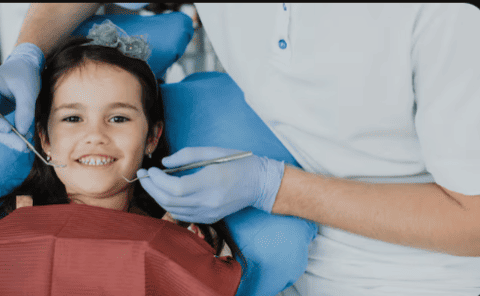Space Maintainer
Tiny Devices. Big Differences for Growing Smiles.
At Dentistry Junior, we believe that early tooth loss shouldn’t mean lifelong dental issues. That’s why our pediatric dentists in JP Nagar, Bengaluru offer customized space maintainers, small but mighty devices that help protect your child’s developing smile.
If your child has lost a baby tooth too early, a space maintainer can hold that gap open and make sure the adult tooth grows in just where it should. It’s a smart and preventive solution that can save you from bigger orthodontic troubles down the road.

Why Do Kids Need Space Maintainers?
Every baby tooth is like a placeholder. When it falls out too early.Whether from decay, injury or a needed extraction the surrounding teeth tend to shift into the empty space. This blocks the path for the permanent tooth underneath which leads to crooked teeth or bite problems.
Space maintainers are designed to prevent that. They ensure the right amount of space is preserved so your child’s adult teeth have room to erupt naturally and align properly.
When Are Space Maintainers Recommended?
Our pediatric dentist may suggest a space maintainer if your child has lost a primary molar or incisor early due to:
Severe tooth decay where the baby tooth had to be removed
An accident or injury causing tooth damage or premature loss
Developmental conditions like ectodermal dysplasia that affect tooth growth
Orthodontic extractions that require future space to be preserved
Risk of overcrowding or early shifting of teeth due to poor alignment
By keeping that tiny gap protected, we’re giving your child’s future smile the best possible start.
Types of Space Maintainers We Offer
Not every child needs the same kind of device. Our dentists will recommend the right type based on your child’s age, the tooth involved, and whether it’s on the upper or lower arch.
1. Fixed Space Maintainers
These are cemented to the nearby teeth and stay in place until the permanent tooth is ready to come in. They’re reliable and don’t require daily removal, great for younger kids.
2. Removable Space Maintainers
Made to be taken out for cleaning, these are typically used in older children or in situations where flexibility is needed. They resemble orthodontic retainers but serve a different purpose.
No matter the type, all our space maintainers are custom-made for comfort, fit, and function.
What to Expect With a Space Maintainer
Worried about discomfort or care? Don’t be. We make it easy and painless.Getting Started: A painless consultation, followed by impressions of your child’s teeth for a custom fit
Fitting: A short, in-clinic visit to place the maintainer
Care Instructions: We teach your child how to brush, rinse, and avoid sticky foods
Follow-Ups: Regular dental checkups every 4–6 months to monitor fit and tooth eruption
Most children adapt within days and don’t even notice it’s there after a while.
Pediatric Space Maintainers in JP Nagar .Why Parents Choose Us
Expert Pediatric Dentists: Specially trained to treat children with care, empathy and fun distractions
State-of-the-Art Equipment: We use modern imaging to precisely plan and place space maintainers
Friendly Environment: Kid-first design from the waiting area to the dental chair
FAQs
Initially, your child might feel a little discomfort, but they will adjust to it over time. If there’s persistent discomfort, contact your dental team.
The duration varies depending on your child’s dental development. Our dentist will recommend the ideal time frame during routine check-ups.
Initially, your child might feel a little discomfort or a change in speech patterns. With time, they usually adapt, and any discomfort tends to decrease.
Regular dental check-ups are crucial to monitor the space maintainer’s effectiveness and ensure it’s well-maintained. Your dentist will recommend the appropriate visit schedule.
Yes, but they might need to avoid sticky or hard foods that could dislodge or damage the space maintainer.

